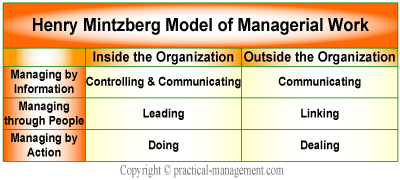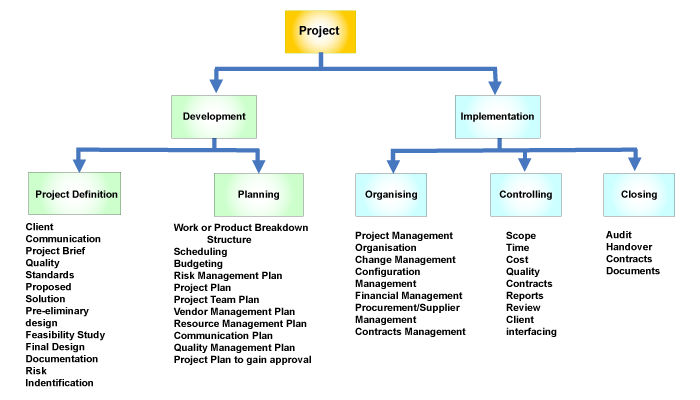This article discusses some of the basic principles of project management that applies to all projects.
General Project Management Principles
that apply to all projects
Change is inevitable and the project cannot be isolated from the change that an organization can go due to external environment. The project manager must keep up with the changes in management practices and technology. Technology projects are relatively complex as they bring difficulties from technology, people, tasks and management.
Cleland and King (1993) suggested that the managers of complex projects should possess the following attributes:
- Knowledge of Technology in relation to project products
- Understanding of the concepts of Management
- Interpersonal Styles to get things done
- Ability to see the project as an open system and understand the external internal interactions
And the fifth point could be to understand the people and social context in which the project will operate.
Why knowledge of Technology is important?
The Project Manager is not expected to have a detailed understanding of the technology, however it is important that he or she understands at the high level the technical solution and the technology involved. The meaning is simple, a construction project manager who should not manage IT projects. Even though an IT infrastructure project manager should not manage a development project unless spends time to grasps the technology involved, stages of development and the solution. In such situations, it is helpful to get hold of the technical solution and understand fully what technology is used and the risks involved.
In short, a project manager is accountable for the technical credibility.
Basic Concepts that do not change for Project Management
Every manager’s day-to-day job requires deciding and doing. They need to be able to mobilize technology and resources in efficient way to achieve task completion and high performance. They do this through the basic process of management- planning, organizing, leading and controlling (P-O-L-C).
Through planning, the manager sets the objectives and determines what actions should be taken to accomplish them. The plans drawn will fail if the proper implementation is not organized. This requires assigning tasks, allocating resources, and arranging activities to implement the plans. Through organizing, the manager brings plans to action. Through Leading, they maintain commitment to the organization vision and enthusiasm within teams to carryout the tasks, provide proper direction and keep the tasks aligned to the organizational goals. Through controlling, the manager will measure the success and failure of the implementation of the plans, evaluate the performance, develop improvement strategies and plans and take corrective actions. They remain in contact with the team members through out the task execution and collect reports on performance for actions and change to the existing plans.
The above management process is a very broad description of what a manager should use in order to manage. However, these broad classifications should be further fragmented into daily activities. Henry Mintzberg (1988) outlined that a manager on day to day basis manages information, people and action within and outside the business unit or organization. This was later called ‘Model of Managerial Work’.

The model acknowledges that the role of a project manager is dependent upon the activities that are either internal or external to the organization or functional unit. The project manager has certain positional powers when he is dealing with situations that are internal to the organization, hence he has better control over the activities and can directly influence them. He has little control over the tasks that extend beyond his organization/unit, his personality, communication and relationships become more prominent factors in getting things done. These differences become quite evident in the figure provided here.
These underlying concepts remain same for project management but adjusted as suitable. Every project is deemed to have at least two stages: Development and Implementation. The development stage would use the defining (PD – Project Definition) and Planning processes; however implementation stage would use Organizing, Controlling and Closing processes. Each of these processes would have tasks and deliverable. These are depicted in summary as below (based on PMI standard):

Essential qualities of a Project Manager
The project manager should be at the least an effective communicator and team manager. He or she should be able to:
- Listen others and provide feedback
- Select right people
- Delegate tasks and manage the team effectively
- Build trust and confidence
- Know what is required and when
- Persistently approach to obtain information and timely communicate
- Negotiate with the project teams, client and suppliers
The style of the project manager should be task and people oriented. He should be more an ‘action manager’ and focus on getting things done and provide adequate support and guidance to his team.
Projects are open systems
A system by definition is a set of interrelated components that accepts inputs and produces outputs in a purposeful manner.
Projects operate within an organization and have defined boundary of what lies within and outside. The boundary helps to define the scope of the project and often has an interaction with the external entities. This is why they are called open systems. The changes from outside of the project boundary can have impact on the project scope. Thus, this external linkage is important. For example, during economic recessions, the organizations activities contract and as a result current projects can be put on hold or asked to deliver reduced functionality due to financial cut backs. In other cases, the client keeps on asking for more functionality outside of the contracted requirements. Thus, the ability of managing changes is key in open systems projects.
The open systems approach enables manager to examine the context in which they make decisions. It is easy to ignore the external influences and take decisions, thus shrinking the magnitude of the problem.
Thus, a functional manager uses analytical approach, while a project manager uses systems approach.
What about external relationships?
Understanding people in everyday relationships in organizations is important. It is important to understand the role of society and law that can impact the projects and dictate how they should be managed. The systems approach would let us identify these external influences and strategy to manage them can be devised. For example, a project that provokes the society can be managed by educating or a project that lays off people during and after completion as technology is replacing people; then appropriate redundancy procedures to be followed, unions to be managed along with the emotions of the laid off employees.
Thus, it is important to understand the social context within which the project operates.
Conclusion
The criticality of the project occurs early in the project, thus it is important that we:
- Understand the technology
- Understand the management principles
- Defined the high level boundary of the project
- Carefully defined and plan what stages should the project undergo
- Have identified a suitable project manager
